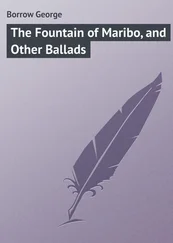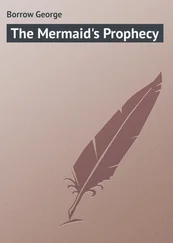George Borrow - The Bible in Spain. Volume 2 of 2
Здесь есть возможность читать онлайн «George Borrow - The Bible in Spain. Volume 2 of 2» — ознакомительный отрывок электронной книги совершенно бесплатно, а после прочтения отрывка купить полную версию. В некоторых случаях можно слушать аудио, скачать через торрент в формате fb2 и присутствует краткое содержание. ISBN: , Жанр: foreign_prose, Путешествия и география, foreign_language, на английском языке. Описание произведения, (предисловие) а так же отзывы посетителей доступны на портале библиотеки ЛибКат.
- Название:The Bible in Spain. Volume 2 of 2
- Автор:
- Жанр:
- Год:неизвестен
- ISBN:http://www.gutenberg.org/ebooks/35676
- Рейтинг книги:4 / 5. Голосов: 1
-
Избранное:Добавить в избранное
- Отзывы:
-
Ваша оценка:
- 80
- 1
- 2
- 3
- 4
- 5
The Bible in Spain. Volume 2 of 2: краткое содержание, описание и аннотация
Предлагаем к чтению аннотацию, описание, краткое содержание или предисловие (зависит от того, что написал сам автор книги «The Bible in Spain. Volume 2 of 2»). Если вы не нашли необходимую информацию о книге — напишите в комментариях, мы постараемся отыскать её.
The Bible in Spain. Volume 2 of 2 — читать онлайн ознакомительный отрывок
Ниже представлен текст книги, разбитый по страницам. Система сохранения места последней прочитанной страницы, позволяет с удобством читать онлайн бесплатно книгу «The Bible in Spain. Volume 2 of 2», без необходимости каждый раз заново искать на чём Вы остановились. Поставьте закладку, и сможете в любой момент перейти на страницу, на которой закончили чтение.
Интервал:
Закладка:
As for myself, when I viewed that wide ocean and its savage shore, I cried, “Such is the grave, and such are its terrific sides; those moors and wilds, over which I have passed, are the rough and dreary journey of life. Cheered with hope, we struggle along through all the difficulties of moor, bog, and mountain, to arrive at – what? The grave and its dreary sides. Oh, may hope not desert us in the last hour – hope in the Redeemer and in God!”
We descended from the eminence, and again lost sight of the sea amidst ravines and dingles, amongst which patches of pine were occasionally seen. Continuing to descend, we at last came, not to the sea, but to the extremity of a long narrow firth, where stood a village or hamlet; whilst at a small distance, on the western side of the firth, appeared one considerably larger, which was indeed almost entitled to the appellation of town. This last was Corcuvion; the first, if I forget not, was called Ria de Silla. We hastened on to Corcuvion, where I bade my guide make inquiries respecting Finisterre. He entered the door of a wine-house, from which proceeded much noise and vociferation, and presently returned, informing me that the village of Finisterre was distant about a league and a half. A man, evidently in a state of intoxication, followed him to the door. “Are you bound for Finisterre, Cavalheiros ?” he shouted.
“Yes, my friend,” I replied, “we are going thither.”
“Then you are going amongst a fato de borrachos ,” 4 4 “Flock of drunkards.” Fato , in Gal. as in Port. = a herd or flock. Span. hato .
he answered. “Take care that they do not play you a trick.”
We passed on, and, striking across a sandy peninsula at the back of the town, soon reached the shore of an immense bay, the north-westernmost end of which was formed by the far-famed cape of Finisterre, which we now saw before us stretching far into the sea.
Along a beach of dazzling white sand we advanced towards the cape, the bourne of our journey. The sun was shining brightly, and every object was illumined by his beams. The sea lay before us like a vast mirror, and the waves which broke upon the shore were so tiny as scarcely to produce a murmur. On we sped along the deep winding bay, overhung by gigantic hills and mountains. Strange recollections began to throng upon my mind. It was upon this beach that, according to the tradition of all ancient Christendom, Saint James, the patron saint of Spain, preached the Gospel to the heathen Spaniards. Upon this beach had once stood an immense commercial city, the proudest in all Spain. This now desolate bay had once resounded with the voices of myriads, when the keels and commerce of all the then known world were wafted to Duyo. 5 5 San Martin de Duyo, a village, according to Madoz, of sixty houses. There are no remains of the ancient Duyo.
“What is the name of this village?” said I to a woman, as we passed by five or six ruinous houses at the bend of the bay, ere we entered upon the peninsula of Finisterre.
“This is no village,” said the Gallegan, “this is no village, Sir Cavalier; this is a city, this is Duyo.”
So much for the glory of the world! These huts were all that the roaring sea and the tooth of time had left of Duyo, the great city! Onward now to Finisterre.
It was mid-day when we reached the village of Finisterre, consisting of about one hundred houses, and built on the southern side of the peninsula, just before it rises into the huge bluff head which is called the Cape. We sought in vain for an inn or venta , where we might stable our beast; at one moment we thought that we had found one, and had even tied the animal to the manger. Upon our going out, however, he was instantly untied and driven forth into the street. The few people whom we saw appeared to gaze upon us in a singular manner. We, however, took little notice of these circumstances, and proceeded along the straggling street until we found shelter in the house of a Castilian shopkeeper, whom some chance had brought to this corner of Galicia – this end of the world. Our first care was to feed the animal, who now began to exhibit considerable symptoms of fatigue. We then requested some refreshment for ourselves; and in about an hour, a tolerably savoury fish, weighing about three pounds, and fresh from the bay, was prepared for us by an old woman who appeared to officiate as housekeeper. Having finished our meal, I and my uncouth companion went forth, and prepared to ascend the mountain.
We stopped to examine a small dismantled fort or battery facing the bay, and, whilst engaged in this examination, it more than once occurred to me that we were ourselves the objects of scrutiny and investigation; indeed, I caught a glimpse of more than one countenance peering upon us through the holes and chasms of the walls. We now commenced ascending Finisterre; and, making numerous and long détours , we wound our way up its flinty sides. The sun had reached the top of heaven, whence he showered upon us perpendicularly his brightest and fiercest rays. My boots were torn, my feet cut, and the perspiration streamed from my brow. To my guide, however, the ascent appeared to be neither toilsome nor difficult. The heat of the day for him had no terrors, no moisture was wrung from his tanned countenance; he drew not one short breath; and hopped upon the stones and rocks with all the provoking agility of a mountain goat. Before we had accomplished one-half of the ascent, I felt myself quite exhausted. I reeled and staggered. “Cheer up, master mine; be of good cheer, and have no care,” said the guide. “Yonder I see a wall of stones; lie down beneath it in the shade.” He put his long and strong arm round my waist, and, though his stature compared with mine was that of a dwarf, he supported me as if I had been a child to a rude wall which seemed to traverse the greater part of the hill, and served probably as a kind of boundary. It was difficult to find a shady spot: at last he perceived a small chasm, perhaps scooped by some shepherd as a couch in which to enjoy his siesta . In this he laid me gently down, and, taking off his enormous hat, commenced fanning me with great assiduity. By degrees I revived, and, after having rested for a considerable time, I again attempted the ascent, which, with the assistance of my guide, I at length accomplished.
We were now standing at a great altitude between two bays, the wilderness of waters before us. Of all the ten thousand barks which annually plough those seas in sight of that old cape, not one was to be descried. It was a blue shiny waste, broken by no object save the black head of a spermaceti whale, which would occasionally show itself at the top, casting up thin jets of brine. The principal bay, that of Finisterre, as far as the entrance, was beautifully variegated by an immense shoal of sardinhas , on whose extreme skirts the monster was probably feasting. From the other side of the cape we looked down upon a smaller bay, the shore of which was overhung by rocks of various and grotesque shapes; this is called the outer bay, or, in the language of the country, Praia do mar de fora : 6 6 Galician; lit. the shore of the outer sea.
a fearful place in seasons of wind and tempest, when the long swell of the Atlantic pouring in is broken into surf and foam by the sunken rocks with which it abounds. Even on the calmest day there is a rumbling and a hollow roar in that bay which fill the heart with uneasy sensations.
On all sides there was grandeur and sublimity. After gazing from the summit of the cape for nearly an hour, we descended.
On reaching the house where we had taken up our temporary habitation, we perceived that the portal was occupied by several men, some of whom were reclining on the floor drinking wine out of small earthen pans, which are much used in this part of Galicia. With a civil salutation I passed on, and ascended the staircase to the room in which we had taken our repast. Here there was a rude and dirty bed, on which I flung myself, exhausted with fatigue. I determined to take a little repose, and in the evening to call the people of the place together, to read a few chapters of the Scripture, and then to address them with a little Christian exhortation. I was soon asleep, but my slumbers were by no means tranquil. I thought I was surrounded with difficulties of various kinds, amongst rocks and ravines, vainly endeavouring to extricate myself; uncouth visages showed themselves amidst the trees and in the hollows, thrusting out cloven tongues, and uttering angry cries. I looked around for my guide, but could not find him; methought, however, that I heard his voice down a deep dingle. He appeared to be talking of me. How long I might have continued in these wild dreams I know not. I was suddenly, however, seized roughly by the shoulder, and nearly dragged from the bed. I looked up in amazement, and by the light of the descending sun I beheld hanging over me a wild and uncouth figure; it was that of an elderly man, built as strong as a giant, with much beard and whisker, and huge bushy eyebrows, dressed in the habiliments of a fisherman; in his hand was a rusty musket.
Читать дальшеИнтервал:
Закладка:
Похожие книги на «The Bible in Spain. Volume 2 of 2»
Представляем Вашему вниманию похожие книги на «The Bible in Spain. Volume 2 of 2» списком для выбора. Мы отобрали схожую по названию и смыслу литературу в надежде предоставить читателям больше вариантов отыскать новые, интересные, ещё непрочитанные произведения.
Обсуждение, отзывы о книге «The Bible in Spain. Volume 2 of 2» и просто собственные мнения читателей. Оставьте ваши комментарии, напишите, что Вы думаете о произведении, его смысле или главных героях. Укажите что конкретно понравилось, а что нет, и почему Вы так считаете.












